"剧场版", 共 个
-

妖怪ウォッチ♪ ジバニャンVSコマさん もんげー大決戦だニャン
第1集 类型:暂无The Jibanyan's favorite sweets store Chocobo and Komasan's favorite soft serve ice cream parlor suddenly vanish from the town due to the actions of a mysterious yo-kai creature. The yo-kai says that Jibanyan and Komasan must face off to determine which of the two shops will return.
-
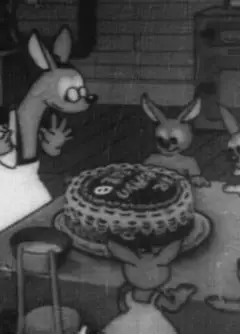
袋鼠过生日
第1集 类型:暂无 -
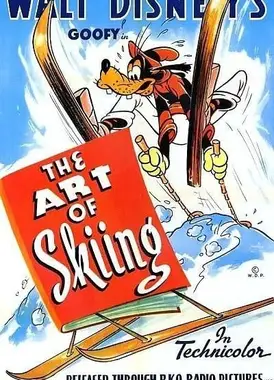
滑雪的艺术
类型:暂无白雪皑皑的山谷小屋,我们伟大而搞笑的冒险家古菲(乔治·约翰逊 George Johnson 配音)正在温暖的被窝里享受睡眠的快乐。这时闹钟响起,睡眼惺忪的男主角懒洋洋地离开暖烘烘的被窝,即将进行他的滑雪表演。这是一门对技术和平衡感要求极高的运动,按照画外音的解说(约翰·麦克莱斯 John McLeish 配音),我们了解到制造雪橇的材料以及化学所需的其它器材和技巧,笨拙的古菲费尽九牛二虎之力穿戴整齐,坐着索道开赴山顶。 也许我们期待开见一次次精彩的表演,无奈面对这个完全不在状态的主角古菲,也许能够等来的只是一个有一个令人叹为观止的以外……
-
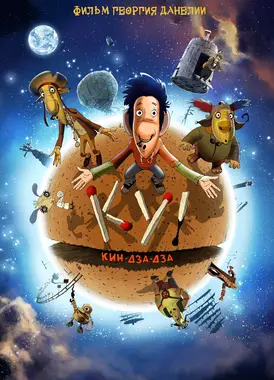
外星奇遇
第1集 类型:暂无年轻且有抱负的 DJ Tolik 和世界著名大提琴家Vladimir Chizhov在莫斯科喧闹的街道上遇到了一名赤脚男人。通过按下奇怪机器的按钮,他们被传送到沙漠星球Pluke... 动画翻拍自Georgiy Daneliya1986年的电影《Ku! Kin-dza-dza 》,该片讲述了Tolik 和Vova叔叔的冒险故事,与原著一样令人兴奋和有趣。在这个沙丘世界里,居民被分为两类——Patsaks 和 Chatlanians。平凡的火柴却有着不可思议的价值,人们通过裤子的颜色来区分尊卑等级。
-
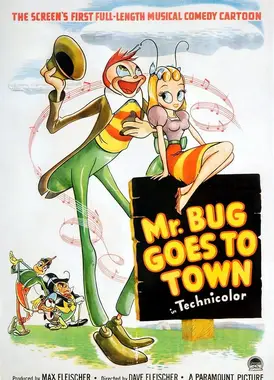
虫先生进城记
第1集 类型:暂无1941年弗莱舍工作室推出第二部动画长片《虫先生进城记》,讲述昆虫家园被人类毁坏,蚂蚱带领大家迁徙进城,一路上保护情人小蜜蜂,抵御甲壳虫及小喽啰蚊子苍蝇的故事。 本片上映前珍珠港事件爆发,导致票房表现平平,弗莱舍兄弟因经济原因将弗莱舍工作室转手派拉蒙,自此30年代迪士尼最大的竞争对手日渐式微。 1951年本片在日本上映,给高畑勋与宫崎骏留下了美好的童年记忆。2009年,吉卜力美术馆引入本片,在日本重映。
-

早睡早起
类型:暂无唐老鸭昏昏欲睡,准备上床睡觉,但这之前却遇到一些挑战。等他终于准备入睡,他又被烦人的闹钟滴答声吵醒。唐老鸭最终能睡着吗?
-
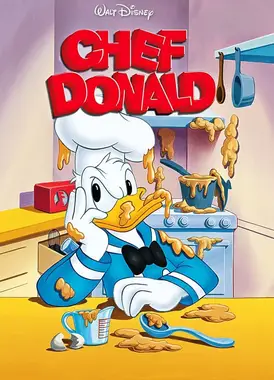
厨师唐老鸭
类型:暂无Donald is listening to a radio cooking program and mixes up a batch of waffles, but he's distracted and uses rubber cement instead of baking powder. The batter proves to be unusually stiff. First, his spoon gets stuck and the batter acts like a rubber-band airplane, flying the bowl around the room. Next, Donald falls with his head in the batter, he tries to get out but initially, he can't (with angry quacking and a lot of bubbles popping), and his tail in the waffle iron. Then he tries to chop it with an ax, and the ax flies up and splits the room in half. Finally, he throws the bowl out the door; it sticks to the knob while the bowl gets stuck between two trees. The stretching causes a branch to knock on the door, tricking Donald into opening it and letting the batter back in. After several attempts, he has had enough and rushes to the radio studio where the cooking program is being broadcast, and takes his anger out on Old Mother Mallard. As he approaches the radio station, the radio shakes and wobbles showing that Donald is violently attacking Old Mother Mallard!
-
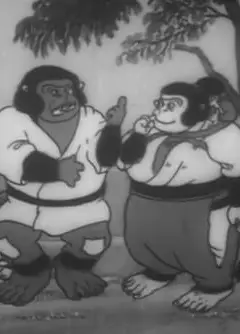
动物村的风波
第1集 类型:暂无 -
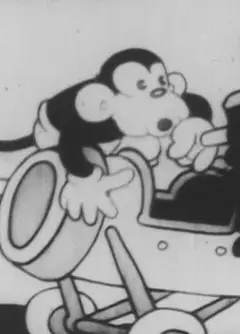
猴子三吉:防空战篇
第1集 类型:暂无 -

消失的大兵
第1集 类型:暂无Private Duck is a camouflage painter. He paints a giant cannon with some very gaudy colors, until Sergeant Pete explains that the point is to make it so the cannon can't be seen. Donald finds a bucket of experimental invisible paint and makes the cannon disappear. Pete isn't happy with this, and knocks Donald into the paint, then chases him, until he runs into the general. As Pete tries to explain, Donald prods him with a cactus, then goes off to steal some pies. Eventually, Pete goes berserk and starts throwing grenades willy-nilly and gets in more trouble with the general.
-

奥运冠军
类型:暂无一个解说员在讲解奥运会的历史,而高飞则在演示各种事件。
-
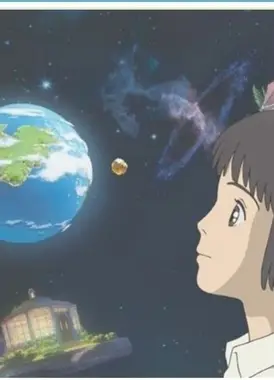
种下星星的日子
第1集 类型:暂无《种下星星的日子》(日语:星をかった日)是日本动画导演宫崎骏为三鹰之森吉卜力美术馆制作片长约16分钟的短篇动画电影,在2006年1月3日于美术馆内公开上映。 “时间局”是一个严格监督人类使用时间方式的机构,为了逃离时间局的控制而离家出走的少年主角“诺那”(ノナ),在乡下遇见了神秘的女性“妮妮雅”(ニーニャ),并与她开始在农场的新生活。 有一天,诺那在路上遇到一对外型如鼯鼠及青蛙的神秘流浪商人“史克佩罗”(スコッペロ)和“麦金索”(メーキンソー),他们希望将贩卖用的星星种子,交换诺那自己培育的芜菁……。
-
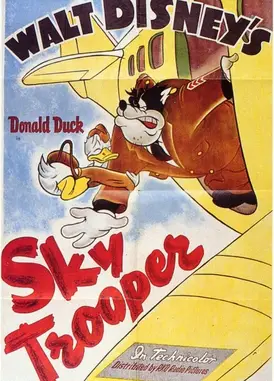
空降兵
第1集 类型:暂无Donald is stuck on KP at an air training base. Sergeant Pete gives him a huge pile of potatoes to peel first, then gives him some tests: close your eyes and touch fingers, pin the tail on the airplane. He finally gets sent aloft, only to discover it's a parachute jump. Eventually, both Donald and Pete end up falling with no chutes and a bomb.
-
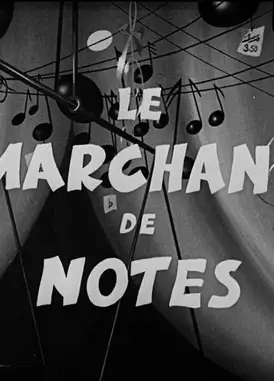
音符商人
类型:暂无 -
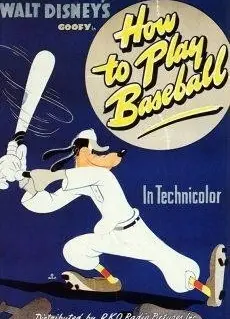
如何打棒球
类型:暂无Goofy demonstrates how to play baseball. He plays all positions for both teams, and demonstrates many different types of pitches.
-

唐老鸭打雪仗
类型:暂无冬天到来,经过一夜的大雪,第二天早上,房子外面银装素裹,宛如童话中的世界。唐老鸭(克拉伦斯·纳什 Clarence Nash 配音)隔窗望去,甚为喜欢,他打开门却被冻住了嘴巴。于是赶忙回房间穿上厚厚的衣服,带着雪橇板爬山坡玩耍。他好不容易爬到山顶,突然看到三个小外甥休伊、杜威和路易正在山脚下对一个巨大的雪人,为老不尊的唐老鸭计上心头,坐在雪橇板上以极快的速度向山下俯冲,三个小家伙吓得连忙逃跑,雪人则被撞碎。孩子们面面相觑,唐老鸭在一旁乐不可支。孩子们悄悄商议,想出个办法报复了这个坏心眼的舅舅。 然而唐老鸭怎能允许这样的失败,于是他重整旗鼓,和孩子们进行了一场不断升级的大雪战……
-

里约2096:爱与骚动的故事
第1集 类型:暂无巴西金牌编剧鲁伊兹·波洛内西(《大惊小怪》)出手不凡,第一次执导长片就带来了这部大气磅礴的科幻史诗动画大作。影片以横贯五百年、四个时期的巴西为背景,在历史与未来之间,主人公经历生死轮回。与动画大师宫崎骏一样,导演坚持使用手绘创作,为动画风格与人物造型带来一丝执着与复古的色彩,而上海国际电影节的老朋友赛尔顿·梅罗(《小丑》)与戛纳电影节新人奖得主罗德里戈·桑托罗(《球场情圣埃莱诺》)也都在片中倾情献声。
-

风化的旋律
类型:暂无A bee exits a flower and flies with no apparent destination in mind. It discovers an abandoned phonograph in a field of flowers. There is a record on the phonograph, and the bee learns to use its stinger as a stylus. Recorded music is heard from the record. Other insects start dancing to the music. As different songs are heard, the insects react to them in various ways. When the bee gets tired, a hedgehog briefly replaces it as the stylus. The bee soon returns to its music-playing. The bee learns to dance to the music. The dance party ends when the satisfied bee flies away from the phonograph.
-
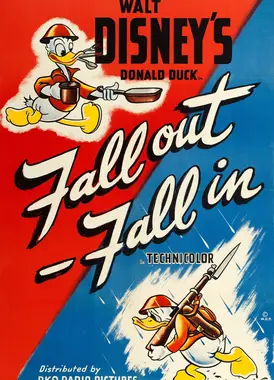
陆兵行军
第1集 类型:暂无Donald experiences the trials and tribulations of Army life: marching through summer sun and rain day after day and setting up camp in the evening, which takes Donald so long it is sunrise before he is finished.
-

唐老鸭的轮胎麻烦
类型:暂无While speeding on the road, Donald Duck runs over a nail on a horseshoe ("Good luck! Bah!") causing it to pop his tire, necessitating its replacement with the car's spare. He encounters difficulty lifting the car with his jack, removing the damaged tire, and repairing it with a patch. Unfortunately for him, all four tires immediately pop once he resumes driving (he rants out "Retreads!" and blows a fuse), but he continues his trip undaunted on four flats.
-

小兵张嘎
第1集 类型:暂无1943年是抗日战争的关键时刻,华北、华东等地的战斗异常激烈,而故事集中在白洋淀,向往革命英雄的热情少年张嘎带着仇恨以及对于战斗生涯的向往,去寻找游击队,终于巧遇罗金保,如愿进入了雁翎队,成为梦寐以求的小侦察员。 养完伤的嘎子偷偷的走上去寻找队伍的路,在东山村巧遇为了保证军火万无一失的樱木带领着大批军队捉拿人质。胖墩父亲在保护嘎子之后,也被日本军队押走了。强烈的使命感使得嘎子跟着远去的日本军队,因为他要实现给胖墩的承诺。与此同时,日军的重要军火已经来到,万无一失,负责这里防务的樱木不敢松懈。 嘎子侦察到日本军队把东山村的老百姓以及老钟押上火车做人质,心生救人的念头,嘎子趁着混乱上了火车。 一直准备炸毁火车的雁翎队则在火车经过的桥上埋了炸弹,当众人得知人质在车上的消息后,变得不知所措……
-
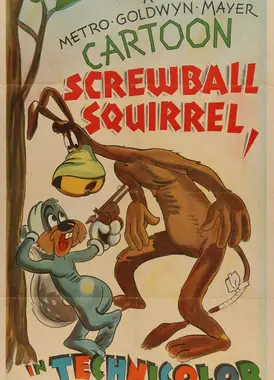
Screwball Squirrel
类型:暂无在鸟语花香、风景如画的大森林里,小松鼠们开心的采集果实。灰色的小松鼠珊米天真无邪,可爱漂亮,她偶遇一只通体红色且长相夸张的松鼠。两只松鼠一番交谈后,红松鼠将珊米制服。因为他讨厌珊米所代表的那种真善美的可爱小故事,他希望主宰这部动画,让动画片充满追逐打斗。他的邪恶计划初步得逞,随后便打电话给附近的老狗肉头。肉头本身脾气非常好,但是红松鼠想方设法激怒对方。 于是乎一部原本充满和谐温暖的小动画,就这样被红松鼠变成了战争动画……
-
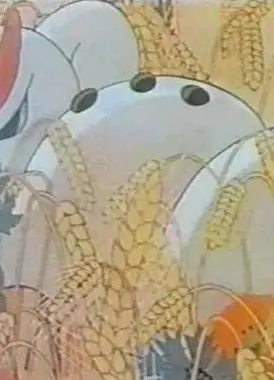
雪人
类型:暂无Under snowing weather, a snowman gains a heart and comes to life. The cheerful snowman starts enjoying life, though he suffers a few misadventures. While exploring a human house, he learns how to use a calendar. He learns that it is January. He wants to experience July, and enters a refrigerator to wait. When July arrives, the Snowman exits the refrigerator, and celebrates. The warm weather eventually melts him down. He sings as he dies. A rabbit mourns his death, but takes the snowman's carrot to use as food.
-
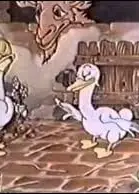
一只小笨鹅
类型:暂无Das dumme Gänslein (The Silly Goose) is one in a trio of German animated short films produced in 1944 by Hans Fischerkoesen, who was the chief animator and author. It is a tale of a female goose consumed by adventure and urban glamour in her countryside life, who had to be saved from a cunning fox by her friends and family.[1] The moral of the tale was not be extravagant and adventurous due to its consequences and it not being what one would expect, and promoting that people should live a ‘normal’ German family life. The animation has an underling theme of Nazi propaganda. It symbolises the Völkisch ideology to be traditionally conventional, demonstrating the idea that a woman's main purpose was to produce ‘true’ German children, and not be individualistic or sexually sinful.[2] It represents that if you vary from the traditional German life then the consequences could be dire, possibly leading to death. This can relate to the Nazi fear policy, by which people who opposed the regime or were seen as asocial, were punished and it could have eventually lead to their death. The film also indirectly contains anti-Semitism through the character of the cunning fox.